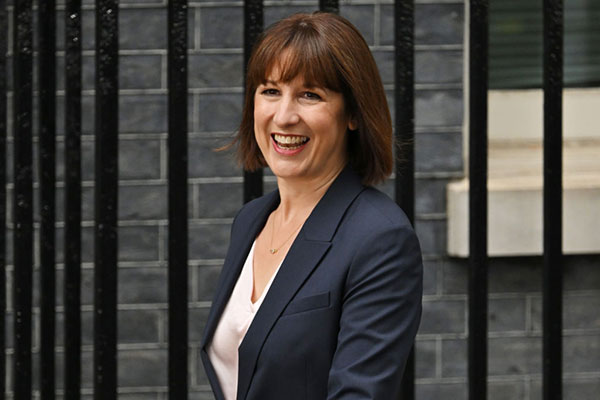What can we expect from the Budget that isn’t a tax hike?
As the talk of tax rises hogs the pre-Budget rumour mill, Rachel Lacey explores what else to look out for in the chancellor’s speech next month.
18th September 2024 12:30

We’re all well and truly bracing ourselves for a round of tax increases in the upcoming Budget – the first of the new Labour government.
After axing the winter fuel payment for all but the poorest pensioners within weeks of her move into Downing Street, Chancellor Rachel Reeves has been quick to show she means business, and has repeatedly warned next month’s Budget will have to include some “difficult decisions” if she’s to successfully tackle the £22 billion black hole in the UK’s finances.
- Invest with ii: SIPP Account | Stocks & Shares ISA | See all Investment Accounts
It means that speculation over what the chancellor might have in store for wealth taxes, including capital gains tax (CGT), inheritance tax (IHT) as well as the sticky issue of pensions taxation, is reaching fever pitch. But Labour has got lots of other decisions to make when it comes to our personal finances, so we’ll (temporarily) be parking the tax speculation and taking a look at some of the other areas that Rachel Reeves might be looking at in October and what she might be doing with some of her predecessor’s proposals.
1) ISA simplification
Labour has already announced that it plans to scrap the British individual savings account (ISA) before it even made it out of the gate, prompting speculation that long called for ISA simplification might just be on the cards.
In the Autumn Statement last year, the Tories did bring in a number of changes to ISA rules, including the ability to open more than one ISA of the same type in one tax year, as well as the introduction of partial transfers.
But campaigners argued that the changes did not go far enough and that the ISA market is still far too confusing and does little to encourage savers and investors.
Proposals to simplify ISA saving include reducing the overall number of ISAs available and combining the stocks and shares ISA and the cash ISA into one single account. There have also been calls to increase the ISA allowance, which has been stuck at £20,000 a year since April 2017.
- Stockwatch: how CGT Budget rumour might affect share portfolios
- My first five years as an ISA investor
- Is this new type of ISA the one for you?
interactive investor has also made repeated calls to scrap stamp duty on the trading of UK shares – a move that would encourage investment in UK Plc without the need for a British ISA. In a survey, it found that 82% of investors think that stopping stamp duty on shares would encourage people to invest in UK companies, while 37% admitted that the levy had actually put them off investing in the UK.
2) An increase to the personal savings allowance
At the moment the personal savings allowance (PSA) means basic-rate taxpayers can earn £1,000 a year in savings interest before they start paying income tax on that money, while higher-rate taxpayers can earn £500 before tax kicks in (additional-rate taxpayers do not get a PSA).
However, rising interest rates on savings accounts mean that more savers are breaching the allowance and starting to pay tax on their savings. In fact, according to findings from Shawbrook, as many as six million savers are now at risk of paying tax on cash that isn’t being held in an ISA.
Given that the PSA hasn’t changed since it was first launched in 2016, there’s an argument that an increase is long overdue. But with multiple other allowances remaining frozen, increasing pressure to raise tax revenues, and the fact that interest rates are past their peak, it’s unlikely to be a big priority for the chancellor.
3) Help for first-time buyers
Tweaking the Lifetime ISA wouldn’t be simplifying the ISA regime, but it could be a way of helping struggling first-time buyers. Currently savers with Lifetime ISAs can only buy homes worth a maximum of £450,000. That means those who end up buying a home worth more could end up paying a 25% penalty charge to access their savings.
- The taxes Labour might hike in its first Budget
- Sign up to our free newsletter for share, fund and trust ideas, and the latest news and analysis
The £450,000 limit hasn’t changed since the Lifetime ISA was introduced in 2017, despite house prices increasing by more than 30% during that time frame.
The government could step in to improve the situation by increasing the maximum property value or cutting the penalty charge.

4) The state pension and the triple lock
The triple lock remains something of a political hot potato. Not only is it expensive – adding an estimated £11 billion a year to the cost of the state pension, it’s also uncertain, making it difficult to plan public finances. According to analysis from the Institute of Fiscal Studies (IFS), by 2050 it could be costing anything between £5 billion and £45 billion a year.
But on the flip side, it enabled many pensioners to keep their heads above water during the cost-of-living crisis.
Scrapping or even tweaking the pension guarantee could be an easy way for Reeves to make a dent in the black hole, but with Labour committing to keeping the triple lock only a few months ago in its election manifesto, it would be a tricky U-turn to pull off.
That’s not to say that the state pension itself couldn’t be targeted. The state pension age, for example, is scheduled to rise from 66 to 67 between 2026 and 2028, and then to 68 between 2044 and 2046. Earlier this month, the London School of Economics Centre of Economic Performance recommended that the increase to 68 is fast-tracked.
At the more extreme end of the spectrum, Edward Troup, one of Rachel Reeves’ tax advisers, has suggested that the state pension should be means-tested.
5) Pension pots for life
Jeremy Hunt, the former chancellor, put forward the proposal for pension pots for life in his Autumn Statement last year and a consultation quickly followed. The idea is that workers sign up to one private pension at the start of their career for their employer to pay into, which then stays with them when they move from one job to the next. This would mean people don’t end up having multiple small pots - as they do now - that are often difficult to manage and easy to lose track of.
- Pensions case study: how I manage my £1 million SIPP
- How to build a £1million pension and ISA portfolio
However, while the chancellor has not mentioned pots for life specifically, Labour has said that it would like to use the Pensions Bill to tackle what has become known as the “small pot” problem. By finding a way to consolidate smaller pots in one place, it is hoped fewer pensions would be lost and the costs of managing them would be cut.
These articles are provided for information purposes only. Occasionally, an opinion about whether to buy or sell a specific investment may be provided by third parties. The content is not intended to be a personal recommendation to buy or sell any financial instrument or product, or to adopt any investment strategy as it is not provided based on an assessment of your investing knowledge and experience, your financial situation or your investment objectives. The value of your investments, and the income derived from them, may go down as well as up. You may not get back all the money that you invest. The investments referred to in this article may not be suitable for all investors, and if in doubt, an investor should seek advice from a qualified investment adviser.
Full performance can be found on the company or index summary page on the interactive investor website. Simply click on the company's or index name highlighted in the article.
Please remember, investment value can go up or down and you could get back less than you invest. If you’re in any doubt about the suitability of a stocks & shares ISA, you should seek independent financial advice. The tax treatment of this product depends on your individual circumstances and may change in future. If you are uncertain about the tax treatment of the product you should contact HMRC or seek independent tax advice.
Editor's Picks